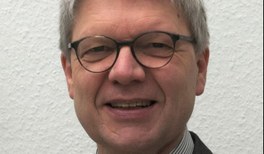PRESS RELEASE
of the German Physical Society
Dieter Meschede to be President of the German Physical Society from 2018 to 2020
The Council of the DPG unanimously elected the Bonn Professor of Physics Dieter Meschede as the DPG’s next President for the term of office from 2018. With some 62,000 members, the DPG is the largest physical society in the world. In April 2018 Meschede succeeds Rolf-Dieter Heuer, who will then become Vice President in rotation.
Bad Honnef, 8 March 2017– It is a good custom of the German Physical Society (DPG) to elect, more than one year before the end of the term of office of the incumbent President, a successor in order to induct him/her as President-elect into the complex and responsible work and ensure continuity in the DPG. The DPG Council has now unanimously elected the Bonn Professor of Physics Dieter Meschede as its future President; with some 62,000 members, the DPG is the largest physical society in the world.
A new President is elected in a two-year rotation. In April 2018 Meschede takes over from the incumbent President and former CERN boss Rolf-Dieter Heuer, who the constitution dictates cannot be re-elected. Like his predecessor, Heuer will then become Vice President for two years.
Dieter Meschede is Head of the Quantum Technology Working Group of the Institute of Applied Physics at the University of Bonn. He has been member or spokesman of numerous joint research projects of the DFG and the European Commission. In 2001 he helped launch the Bonn International Graduate School in Physics and Astronomy (BIGS-PA), which was expanded under an excellence initiative into the BCGS (Bonn-Cologne Graduate School of Physics and Astronomy).
Meschede has been researching in the field of Atomic, Molecular and Quantum Physics for more than thirty years. The “Conveyor Belt of Light” – it moves and sorts individual atoms using laser beams and radiofrequency precision – is one of the outstanding results of his working group’s research. This “conveyor belt” enables atoms to be used as arithmetic units for a quantum computer. This research has received considerable recognition in the shape of an Advanced Grant (DQSIM) from the European Research Council.
Meschede is the editor of the “Gerthsen Physik” textbook, one of the best known German language Physics textbooks. It covers all known topics of Experimental Physics, and is avidly used in the teaching of Physics as a major and minor subject parallel to lectures. Meschede is also the author of the “Optik, Licht und Laser” textbook, which is also published in English, and has been editor-in-chief of the Applied Physics B – Optics and Lasers journal since 2012.
He has won several awards for his scientific work. For instance, in 1989 he was the very first junior scientist to be awarded the Rudolf Kaiser Foundation’s Rudolf Kaiser Prize for his outstanding scientific achievements in Experimental Physics. In 2007 the German Physical Society awarded him the Robert Richard Pohl Prize for his innovative and internationally recognised scientific work over many years in the field of Optical Atomic and Molecular Physics and Quantum Information Processing, as well as for his successful commitment to imparting knowledge of physics and arousing enthusiasm among the general public for physics.
He has won several awards for his scientific work. For instance, in 1989 he was the very first junior scientist to be awarded the Rudolf Kaiser Foundation’s Rudolf Kaiser Prize for his outstanding scientific achievements in Experimental Physics. In 2007 the German Physical Society awarded him the Robert Richard Pohl Prize for his innovative and internationally recognised scientific work over many years in the field of Optical Atomic and Molecular Physics and Quantum Information Processing, as well as for his successful commitment to imparting knowledge of physics and arousing enthusiasm among the general public for physics.
Sporting pursuits: Dieter Meschede is a keen cyclist. And in 1976 he was a world champion rower with the lightweight men’s eight.
The Deutsche Physikalische Gesellschaft e.V. (DPG), which dates back to 1845, is the oldest national society, and with about 62,000 members also the largest physical society, in the world. As a non-profit association it pursues no economic interests. Through conferences, events and publications it promotes the transfer of knowledge within the scientific community and aims to open a window to physics for anyone curious. Its particular focuses are on encouraging the next generation of natural scientists and championing equal opportunities. The DPG’s head office is in Bad Honnef am Rhein. Its representative office in the capital is the Magnus-Haus Berlin.
Website: www.dpg-physik.de
